I. Introduction
The Roman Empire conquered by force much of the known world in days leading up to the birth of Jesus. By 37 BC, the Romans placed Herod the Great to rule Judea as a Roman province, with Roman troops stationed in Jerusalem to enforce the peace.
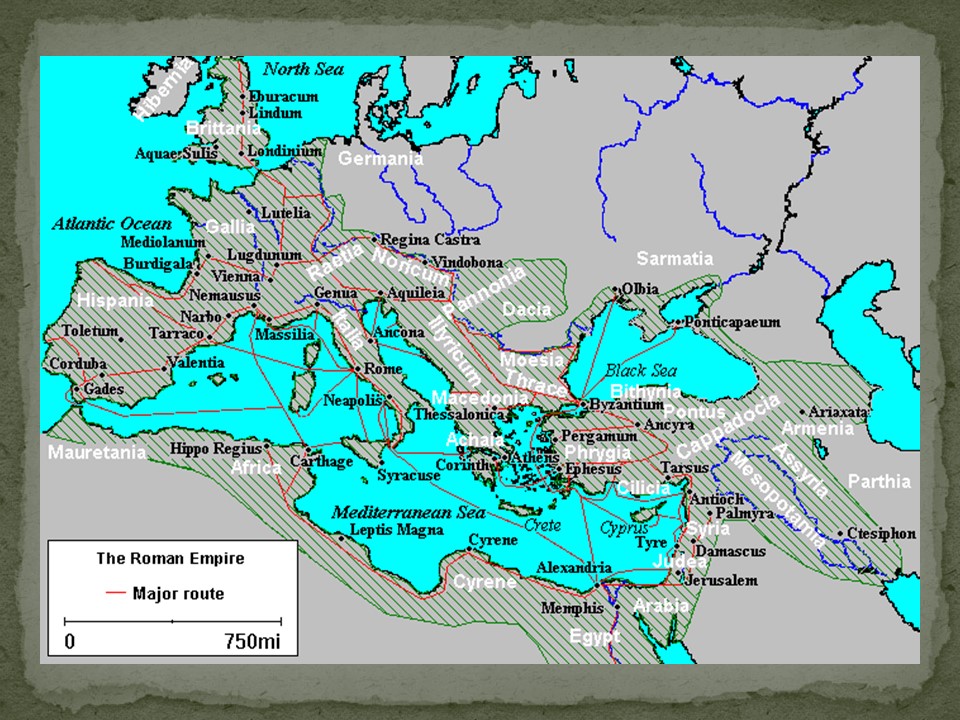
After the death of Herod in 4 BC, Judea came under direct Roman administration and suppression. The Jewish people longed for their Messiah, their deliverer, to free them from bondage, to give the land of Israel back to the Jews.
This was the land where Jesus preached the gospel of salvation to the Jewish people, under bondage to the Roman military machine.
II. Matthew 8:5, Roman Occupation
A Roman legion was approximately 6000 Roman soldiers. To manage such a large number of soldiers, they were organized in groups of approximately 100 called “centuries.”
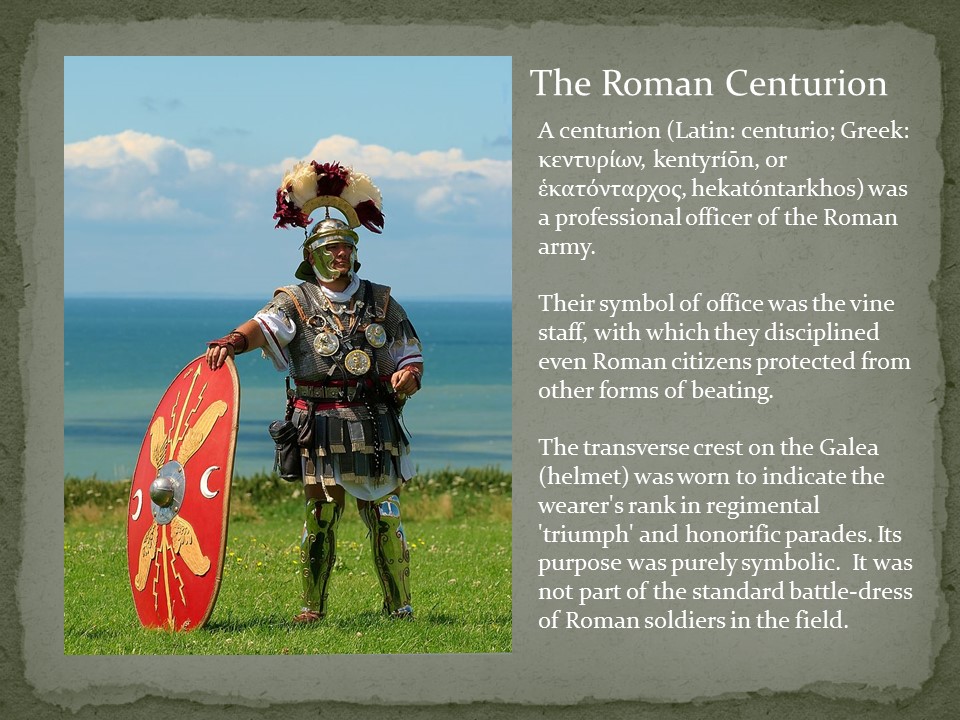
Soldiers that demonstrated superior leadership skills were promoted to command a century and were known as “centurions.” Since these centurions represented the face of the Roman empire, they were hated and despised by the Jewish leaders and people, though in the New Testament, centurions were always mentioned with respect.
During the life and ministry of Jesus, Jesus preached almost entirely to the Jewish people. While ultimately His message was for all of God’s adopted children to place their faith and trust in Him, Jesus reached out first to God’s chosen people. The Jewish people looked for their Messiah to confront the Roman occupation and emerge militarily victorious, but Jesus during His ministry confronted primarily the Jewish Pharisee leaders for their hypocrisy.
However, in the midst of this occupation and hatred of Roman soldiers, Jesus did have a few interactions with the gentiles, and we are going to look at a significant one today. Let’s turn to Matthew 8, verse 5-6 –
When Jesus had entered Capernaum, a centurion came to him, asking for help. “Lord,” he said, “my servant lies at home paralyzed, suffering terribly.”.
Already we can see some interesting things here. Jesus has given His amazing Sermon on the Mount, and now left His hometown of Nazareth and arrived in Capernaum, the hometown of the apostles Peter, Andrew, James and John the fishermen, as well as Matthew the tax collector. And a Roman centurion, commander of a century of soldiers, has come to Jesus for help. This same story is told in Luke 7 and it says elders of the Jews came to plead with Jesus on behalf of the centurion, saying that the centurion is a good man, loves the Jews, and built a synagogue for the Jews. Not your typical Roman centurion.
The centurions had a reputation as ruthless warriors, and they often took slaves or servants from the local population. Neither Matthew or Luke mention this, but it’s very possible the servant is Jewish. And when a servant or slave becomes paralyzed while in service to a centurion, they were no longer of any use. Under Roman law, slaves that could no longer perform their duties could be killed.
But this centurion seems unique. As a commanding soldier in the occupying Roman army, he could expect to order a Jewish rabbi like Jesus to appear before him. But instead, rather than summoning Jesus, the centurion comes to Jesus. Rather than trying to command Jesus, he asks Jesus for help. And instead of asking for a personal favor, the centurion comes to Jesus humbly to ask for help on behalf of another. Perhaps if the servant was Jewish, the centurion was more confidant that Jesus would come heal a Jew. Jesus’s response is immediate.
III. Matthew 8:7-9, The Humble Centurion
It says in verse 7,
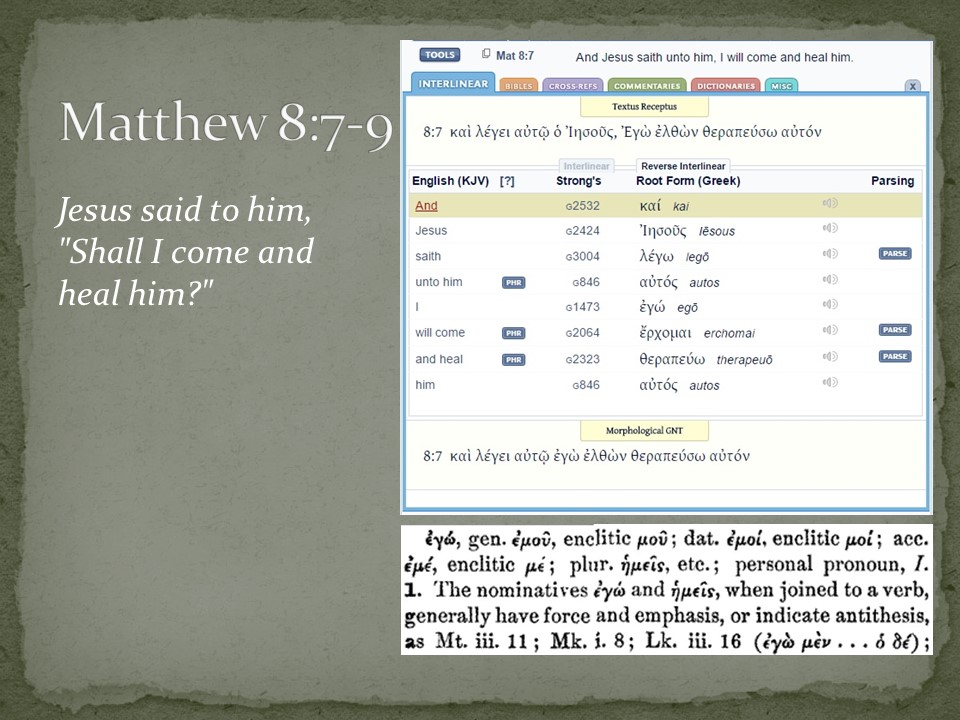
Jesus said to him, “Shall I come and heal him?”
Some translations translate this as a statement, “I shall come and heal him.” But the Greek word for “I” used by Jesus, “egō” is only used emphatically. “Shall *I* come and heal him?” Sort of like Miss Piggy saying, “Moi?” Or Robert De Niro saying, “You talkin’ to me? You talking to *me*?”
Jesus is pointing out to us and to those around him how unique this request is. “Are you, a Roman centurion, asking for a favor? From a Jew?” Is this a really a polite request? Or is this an order from a commanding soldier to a subservient occupied Jew?
The commanding Roman centurion soldier responds humbly, and acknowledges that Jesus’ authority is supreme. Verse 8-9 –
The centurion replied, “Lord, I do not deserve to have you come under my roof. But just say the word, and my servant will be healed. For I myself am a man under authority, with soldiers under me. I tell this one, ‘Go,’ and he goes; and that one, ‘Come,’ and he comes. I say to my servant, ‘Do this,’ and he does it.”
The centurion shows his faith not only by acknowledging his own unworthiness, but also recognizing that the power of Jesus is so great that this request is so small. The Jewish people at the time did not believe that long distance miracles were possible, but the centurion reasons otherwise, based on his own experiences. The centurion can issue commands and receive obedience at a distance because he is under authority of the Roman Empire, which rules the land. Therefore, Jesus, as a ruler under the authority of the God of Israel, merely has to issue a command from His own mouth to banish powers that are subject to Him, such as sickness. He knew the word of Christ and His authority were enough. He believed Christ’s words before He saw the works.
IV. Matthew 10, The Amazing Faith of the Centurion
Jesus then makes two incredible statements. First, in verse 10, Jesus says,
When Jesus heard this, he was amazed and said to those following him, “Truly I tell you, I have not found anyone in Israel with such great faith.”
Jesus is amazed at the gentile’s faith. The gentile doesn’t need to see the signs. The gentile understands, believes, and acts on it. This is an indictment against the Jewish nation which insists on seeing signs as proof and then still doesn’t believe even after they see the signs.
The Greek word “thaumazo” is translated “marveled” or “amazed” and there are only 2 times in the gospels that record Jesus has being amazed. This is the second instance; Jesus is amazed at the great demonstration of belief displayed in the gentile Roman centurion. The first time is in the book of Mark, chapter 6:4-6 –
Jesus said to them, “A prophet is not without honor except in his own town, among his relatives and in his own home.” He could not do any miracles there, except lay his hands on a few sick people and heal them. He was amazed at their lack of faith.
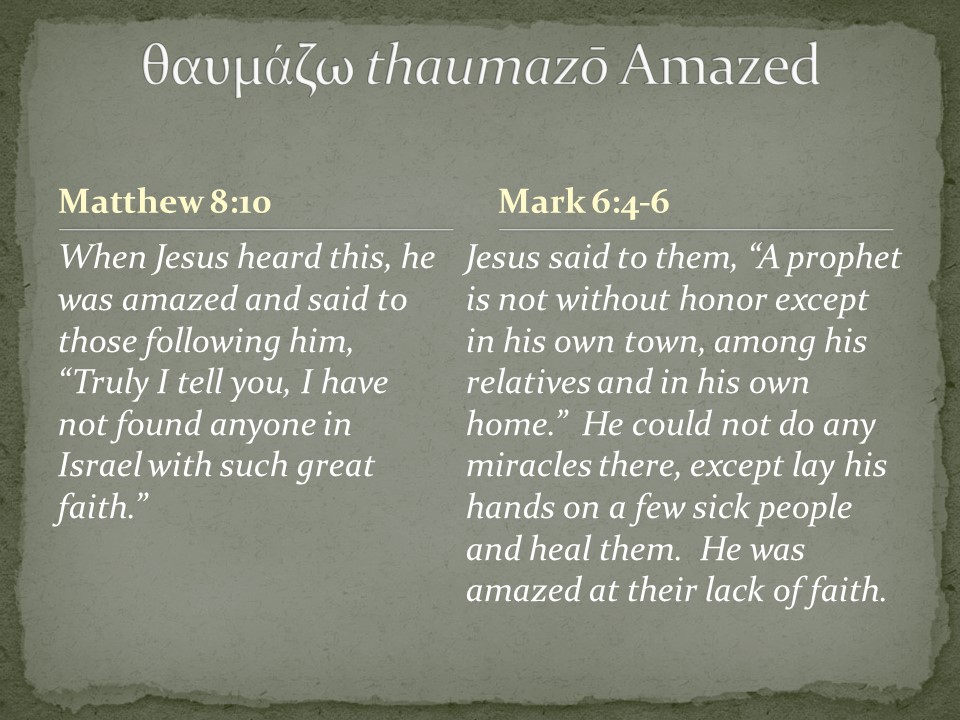
Here Jesus is amazed at the lack of faith. I think Jesus would still be amazed today at the lack of faith. That left to their own, people must answer for every word ever spoken, every deed ever done, and if we are honest with ourselves, our words and deeds fall far short of perfection. And yet, Jesus came to bear the punishment we so richly deserve and bore the whips and scourge on his back for us. By His stripes we are healed, if we but believe in Him. But due to a lack of faith, so many will miss out on this forgiveness. It is truly amazing.
Then Jesus says in Matthew 8:11-12,
I say to you that many will come from east and west, and [m]recline at the table with Abraham, Isaac and Jacob in the kingdom of heaven; but the sons of the kingdom will be cast out into the outer darkness; in that place there will be weeping and gnashing of teeth.”
The centurion gets far more than he asks for, and this is a result of his faith, not his authority as a commanding officer in an occupation army. We should remember that this man asked nothing for himself, only for his servant, and yet he receives two of the finest blessings for which a man could ever hope.
First, the centurion receives the highest praise any man, Jew or Gentile, receives in the Gospels. This Gentile’s faith surpasses that of any Jew in Israel, and it receives the commendation of our Lord. Second, this man receives the Lord’s promise of inclusion and fellowship that he would never have imagined. The centurion did not consider himself worthy or qualified to have Jesus pass through his door. Jews during this day would never pass through the door of a gentile, for they would be defiled.
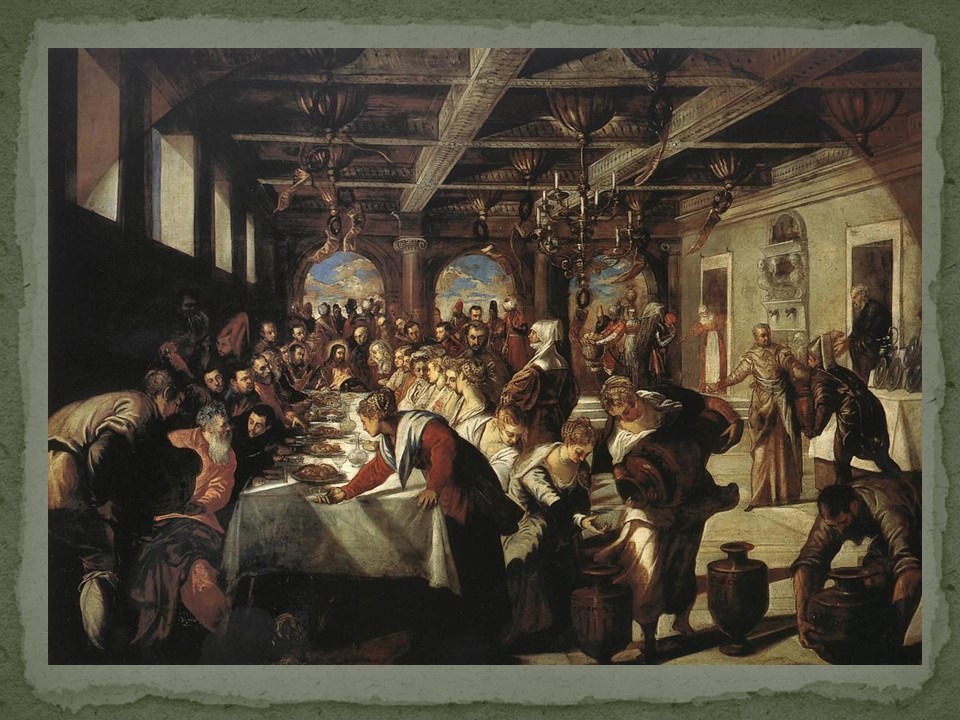
But Old Testament ceremonial food laws also separated Jews and Gentiles. That is what we see in the case of Peter, both in Acts 10 and in Galatians 2. This man could not conceive of Jesus entering his door, much less sitting at his table. But Jesus tells him that in the kingdom he will be reclining at the table with Abraham, Isaac, and Jacob. He also says that while many Gentiles will be found at this table, a number of Jews will not be there.
This would have been a radical idea to the Jews listening. As God’s chosen people, they didn’t not believe gentiles or pagans would belong with God after death. This was a spot reserved for them, the chosen people. But Jesus says that gentiles will have a place at this great Messianic banquet.
Gentiles, pagans, and God’s chosen. Note that Jesus heals at a distance, something the Jews didn’t believe. But I think there is something symbolic here. In the first part of Matthew 8 verses 2-3, Jesus heals a Jewish leper by touching him. For the gentile, Jesus heals from afar. While Israel is God’s chosen people, but now God’s power is demonstrated and magnified through gentiles.
Also, these few words of Jesus tell us a little something of heaven is like:
- It is a place of rest; we sit down or recline in heaven.
- It is a place to sit with good company; we enjoy the friendship of Abraham, Isaac, and Jacob in heaven.
- It is a place with many people; Jesus said that many will come into heaven.
- It is a place with people from all over the earth; from east and west they will come to heaven.
- It is a certain place; Jesus said many will come, but others will be cast out.
This gives me some comfort that we will indeed know one another in heaven. When we pray, maybe we can keep our eyes open. I want you to be able to see me so that when we all get to heaven, you can recognize me. “Look! There’s Michael!” Charles Spurgeon puts it this way:

“But ye shall hear those loved voices again; ye shall hear those sweet voices once more, ye shall yet know that those whom ye loved have been loved by God. Would not that be a dreary heaven for us to inhabit, where we should be alike unknowing and unknown? I would not care to go to such a heaven as that. I believe that heaven is a fellowship of the saints, and that we shall know one another there.”
As well, Jesus reminded his Jewish listeners that the Jews racial identity was not a guaranteed entrance to the kingdom of heaven, just as the Gentile’s racial identity was not an automatic barrier. Though Jews were God’s chosen people, they might end up in hell.
V. Matthew 8:13
In Matthew 8:13,
Then Jesus said to the centurion, “Go! Let it be done just as you believed it would.” And his servant was healed at that moment.
Remember, Jesus had just given his amazing Sermon on the Mount that had a lot of radical ideas in it. The Jews would have loved to hear, “Blessed are the descendants of Abraham,” or “Blessed are those who keep the Law of Moses.” But instead, Jesus redefines who the blessed are. The meek, the poor in spirit, those who mourn or are humble. Blessed are those who hunger and thirst after righteousness. Jesus tells us to love our enemies, and now He is demonstrating this love in action. When Jesus heals the servant, he is providing for the well-being of the enemy, an occupying soldier in the Lord’s holy land. But rather than use this as an excuse, Jesus demonstrates from the Sermon on the Mount, love thy enemies, pray for them, do good to them.
VI. Conclusion
Do we have the faith of the centurion to recognize the greatness of God’s power? If we love the Lord and are obedient to His will, we may have confidence the Lord has the ability and love to fulfill His promises. Jesus provides the authority for us to do the work He has called us to do. The work is His and not our own.
Just like the faith of Abraham his son Isaac we studied a few months ago, Abraham rested on his faith in the Lord. In Genesis 22, The Lord tested Abraham and ask him to sacrifice his only son. But earlier, The Lord had told Abraham he would have more descendants than the stars in the skies. How would the Lord fulfill both promises? In verse Genesis 22:3-5 we read –
Early the next morning Abraham got up and loaded his donkey. He took with him two of his servants and his son Isaac. When he had cut enough wood for the burnt offering, he set out for the place God had told him about. On the third day Abraham looked up and saw the place in the distance. He said to his servants, “Stay here with the donkey while I and the boy go over there. We will worship and then we will come back to you.”
On the third day, a shadow of things to come in Christ Jesus, Abram’s son would live. Abram would sacrifice his son, and somehow his son would live. Abraham showed his faith when he told his servants “we” will return. God fulfills His promises despite appearance. And Abrahams faith was credited to him as righteousness, and he’s listed in the Hebrews hall of faith.
Will we be like Abraham, and trust in the Lord’s promises despite appearances? Will we be like the centurion and trust the Lord has the power to overcome death? The centurion didn’t use his position or status as an excuse not to follow Jesus. He didn’t say, “I’m too busy, I’m a soldier.” Or, “I’m too busy at my job, I can’t right now.” Or, “My company prohibits any sharing of faith.” The centurion was a busy soldier in a pagan, gentile occupation, yet still boldly followed Jesus.
Will Jesus be amazed at our demonstration of faith, like the centurion? Or will he be amazed at the lack of faith, like the people of Nazarene?
Jesus came for His chosen people first, but then stretched out His hand to save the gentiles, too. Not our ancestry, not our works, but only our faith in Jesus as the promised Messiah will save us. This is what makes us a true offspring of Abraham. In Romans 4:13-17, Paul writes –
For the promise to Abraham or to his descendants that he would be heir of the world was not through the Law, but through the righteousness of faith. For if those who are of the Law are heirs, faith is made void and the promise is nullified; for the Law brings about wrath, but where there is no law, there also is no violation.
For this reason it is by faith, in order that it may be in accordance with grace, so that the promise will be guaranteed to all the descendants, not only to those who are of the Law, but also to those who are of the faith of Abraham, who is the father of us all, (as it is written, “A father of many nations have I made you”) in the presence of Him whom he believed, even God, who gives life to the dead and calls into being that which does not exist.
Demonstrate faith. Do not just bring your problems to Jesus. Look at your problems *through* Jesus.
This centurion, who sought the Lord’s mercy toward his servant, came to Him on the basis of faith, and it is this faith which not only healed the servant, but saved the centurion. We here in this room are Gentiles, and our lesson today has told us that Jesus came for us as well as the chosen people, and that by trusting in Him, by relying by faith in the awesome power of Christ Jesus, that we may be saved through His sacrifice.
If we but trust in Him, that amazing faith will save us.
To God be the glory.

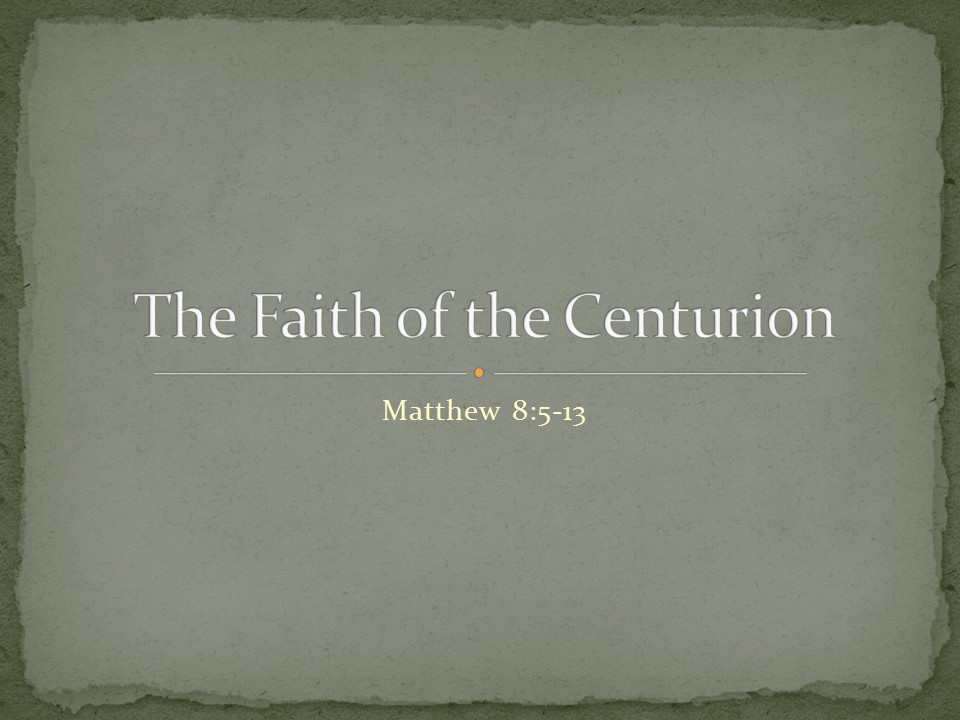
Leave a comment